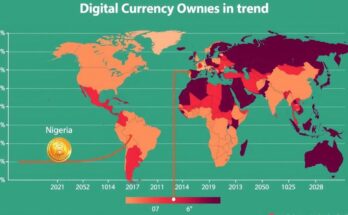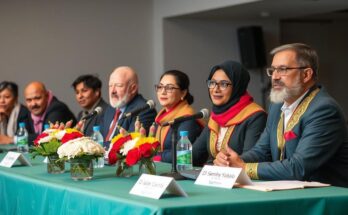Gold smuggling on the Egypt-Sudan border has surged due to ongoing conflict, drawing thousands into illicit trading. Local miners are exploiting the lucrative gold prices in Egypt, facilitating an organized crime network. While authorities claim to regulate the industry, rampant smuggling persists, showcasing the challenges in controlling illegal trade amid economic instability.
The ongoing conflict between the Sudanese army and the Rapid Support Forces (RSF) has significantly bolstered the gold smuggling trade along the Egypt-Sudan border, creating a complex web of organized crime. Thousands from Sudan and beyond partake in this illicit activity, primarily driven by the search for gold in traditional mining regions. The Egyptian Mineral Resources Authority identifies several key state-run mining companies participating in the legitimate gold extraction process, alongside a myriad of international players seeking profit in newly opened mining zones. In recent developments, local miners in Aswan have initiated actions to open over ten new gold mining areas, revealing a lack of governmental oversight. The conflict in Sudan, initiated in April 2023, has led to an expansion of mining operations in regions close to the Egyptian border. Notably, traders capitalize on logistical advantages for transporting gold into Egypt, where prices are currently more lucrative than in Sudan, further fueling smuggling operations. The methods employed to smuggle gold into Egypt vary, often involving organized networks that utilize tribal connections and secret routes. Miners report that strong tribal members play a critical role in facilitating the movement of gold across borders, often exchanging it for cash or other goods in clandestine meetings. While the smuggling operations continue to thrive, Egyptian authorities appear to overlook these illegal activities, purportedly due to the need to bolster national gold reserves amidst a declining economy. Currently, Egypt has shifted its focus toward expanding gold production, significantly increasing its gold reserves in recent years. Consequently, a rising demand for gold has prompted substantial price hikes in the local market, placing Egyptian gold prices above international levels. This lucrative dynamic encourages a flourishing smuggling economy, wherein traders seek to exploit the price discrepancies between Sudan and Egypt. Consequently, the interplay of conflict, economic necessity, and organized crime continues to shape the landscape of gold smuggling on the Egypt-Sudan border.
The rise of gold smuggling along the Egypt-Sudan border is deeply intertwined with the protracted conflict between the Sudanese army and RSF, resulting in a chaotic landscape where organized crime flourishes. Egypt is rich in traditional gold mining sites, particularly in the Nubian region and the Eastern Desert, where a minimal governmental presence has allowed for independent operations to thrive. In this context, national policies aiming to boost gold reserves to stabilize the economy are inadvertently fostering an environment conducive to smuggling, as traders and miners seek profitable avenues in a challenging economic climate.
In summation, the intersection of conflict, economic pressures, and organized crime has catalyzed a surge in gold smuggling across the Egypt-Sudan border. Local miners are adapting to the instability by creating new mining sites while exploiting the price differences of gold between the two countries. Despite the legal efforts made by Egyptian authorities to regulate mining and bolster gold reserves, the uncontrolled nature of the trade highlights the challenges faced in addressing smuggling and organized crime within a rapidly evolving economic landscape.
Original Source: www.middleeasteye.net




